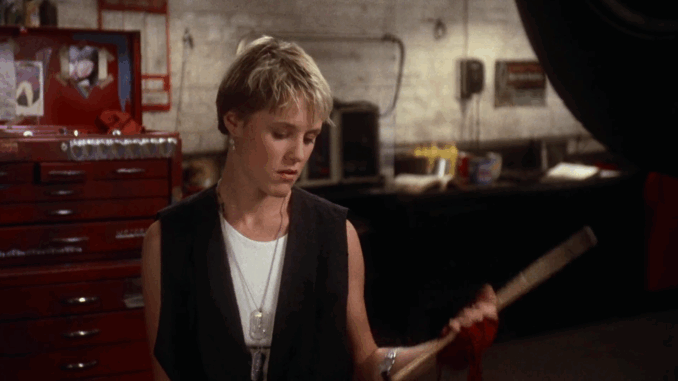
The Iconic Tomboy of Whistle Stop
Imogene “Idgie” Threadgoode is one of the most memorable and beloved characters in Fried Green Tomatoes. Introduced through the nostalgic recollections of Ninny Threadgoode, Idgie defies all expectations of what a Southern woman should be in the early 20th century. With her cropped hair, suspenders, adventurous spirit, and open disregard for societal conventions, Idgie immediately stands out. She is wild, fiercely loyal, deeply compassionate, and unapologetically herself—a tomboy who finds her identity not in traditional femininity, but in freedom, justice, and love.
As a child, Idgie’s life is shattered by the death of her older brother, Buddy. His passing marks the beginning of her resistance to the structured expectations around her. She becomes more untamed, rejecting dresses and decorum in favor of fishing, storytelling, and mischief. She also begins to distance herself from the religious and patriarchal structures of her community, forging a new path carved from autonomy and emotional resilience.
A Life of Nonconformity and Fierce Loyalty
At the center of Idgie’s story is her profound bond with Ruth Jamison. Though never explicitly stated in the film, the nature of their relationship is romantic and deeply emotional. They open the Whistle Stop Café together, run a home full of warmth and welcome, and raise Ruth’s son, Buddy Jr. Idgie’s loyalty to Ruth is unshakable, even in the face of danger. She defends Ruth from an abusive husband and participates in a legal battle where her integrity is put to the test.
Idgie’s ethics are rooted in doing what is right, not what is legal. This is evidenced by her participation in helping Big George and Sipsey protect their own family, even if it means bending or breaking the law. Her sense of justice is not drawn from authority—it comes from love, fairness, and survival.

If Idgie Lived Today: Queer Visibility, Activism, and a Life Outdoors
Imagining Idgie in the 21st century opens a world of possibilities. In a modern setting where queer identities are increasingly visible and celebrated, Idgie might finally be able to live openly as a lesbian without fear or shame. No longer having to hide behind euphemisms or coded language, she could embrace her full identity with pride.
Perhaps she would run a queer-friendly café or community center in the South, serving up her famous fried green tomatoes alongside free legal aid or domestic violence support. Maybe she runs an animal rescue out of a rural farmhouse, surrounded by dogs, goats, and chickens. She would almost certainly still be wearing overalls and boots, spending her days outdoors and her nights telling stories around a fire.
Idgie would also likely be active in social justice. Her innate sense of fairness could lead her to champion causes like LGBTQ+ rights, racial justice, environmental protection, or disability advocacy. She might not care much for social media or the spotlight, but her presence would be felt in the communities she serves and protects. She would be the type of person who quietly makes a massive difference—an unsung hero still living by her own code.
Legacy of a Southern Rebel
Idgie Threadgoode’s legacy lives on not just as a fictional character, but as an archetype of resilience, defiance, and love. She represents the people—especially women and queer individuals—who refuse to conform, who forge their own paths despite tremendous odds. Her life is a testament to the idea that family is chosen, that courage takes many forms, and that kindness is more powerful than convention.
In a world still fighting for equality and compassion, Idgie’s story is more relevant than ever. Whether in the dusty roads of 1930s Alabama or the digitally connected world of today, Idgie remains a beacon for anyone who dares to live authentically, love deeply, and fight for what is right.
She is, and always will be, still wild at heart.
